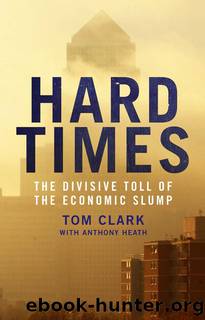Hard Times by Tom Clark

Author:Tom Clark
Language: eng
Format: epub
ISBN: 9780300203776
Publisher: Yale University Press
9
The veil of complacency
It's turned the society against each other. People are turning against their neighbours and their friends. But I think it's been done so that people don't actually stand up.
âNormaâ, 55, with brittle bones that preclude work, on how hard times are dividing Britain's communities
It is never wise to assume that hard times will foster solidarity. Sometimes they did so in Marienthal, as when a neighbour would notice hungry children next door and bring them a bowl of soup. But sometimes impoverished Austrian families would turn on each other. As the slump wore on, increasing numbers snitched on one another to the dole office for tiny transgressions, such as busking with a harmonica while drawing relief.1 Likewise, at much the same time in England's industrial North, Orwell reported on âmuch spying and tale-bearingâ, with one man he knew âseen feeding his neighbour's chickens while the neighbour was awayâ and subsequently being reported to the authorities for having âa job feeding chickensâ.2 The response to hardship can go either way.
Let us consider, first, why a mood of solidarity could rise as the economy sinks. In a famous thought experiment, the philosopher John Rawls provided a theoretical underpinning for egalitarian institutions, with his âveil of ignoranceâ.3 This device imagines prospective citizens debating the best way to run society from behind a âveilâ that blocks their knowledge of the rank that they will occupy within that society. If nobody knows whether they will be born a prince or a pauper, the argument runs, then everybody will surely agree on fair rules that afford the pauper decent protection â just in case it happens to be them. Fear of an economic storm, which can lash anybody, should likewise prove a great leveller â and provide a terrific incentive to co-operate in building shared shelters.
Just listen to Roosevelt's second inaugural â âwe refused to leave the problems of our common welfare to be solved by the winds of chance and the hurricanes of disasterâ â and you can hear how the New Deal was deliberately rooted in this sort of argument.4 The same logic animated Britain's post-war reconstruction.
The âall in it togetherâ pitch supported not only social insurance and labour market protections, but also the macroeconomic commitment to full employment, which became a settled objective for governments in both the UK and the US until it was dislodged by alarm over the great inflation of the 1970s. Just as with taxes and spending, macroeconomic choices over interest rates and so on will create winners and losers, and the balance of political power between them will bear upon the direction of policy.5 But monetary policy in the Great Recession has been nothing like as controversial as during the Depression: this time reflationists have carried the day with relative ease in Britain and America, if not continental Europe. Although it is worth noting in passing that âquantitative easingâ has disproportionately boosted the value of assets held by the rich,6 even this unprecedented aspect of the monetary stance has not proven especially divisive.
Download
This site does not store any files on its server. We only index and link to content provided by other sites. Please contact the content providers to delete copyright contents if any and email us, we'll remove relevant links or contents immediately.
I Have Something to Say by John Bowe(3286)
What Happened to You? by Oprah Winfrey(1477)
Doesn't Hurt to Ask by Trey Gowdy(1402)
Einstein: His Life and Universe by Walter Isaacson(1320)
Solutions and Other Problems by Allie Brosh(1034)
Disloyal: A Memoir by Michael Cohen(1025)
American Dreams by Unknown(861)
Don't Call it a Cult by Sarah Berman(843)
Infinite Circle by Bernie Glassman(831)
Home for the Soul by Sara Bird(814)
Group by Christie Tate(812)
Talk of the Ton by unknow(736)
The Silent Cry by Cathy Glass(684)
Total F*cking Godhead by Corbin Reiff(666)
Severed by John Gilmore(656)
Searching for Family and Traditions at the French Table by Carole Bumpus(650)
The Battle of Mogadishu by Matt Eversmann & Dan Schilling(615)
Before & Laughter by Jimmy Carr(607)
Things I Wish I Knew Before My Mom Died by Ty Alexander(601)
